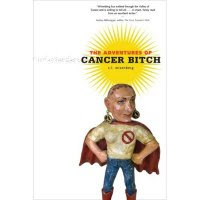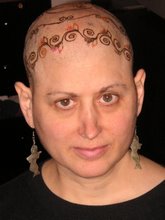
In junior high, we were S and S and S (same names, two different spellings) and L, and sometimes the other L, who wasn't Jewish. S and L were the original friends, I think. I remember going to S's house (I was one of the other Ss) and sitting on the couch, talking to her young bouncy mother, and petting the very smart dog Fluffy. You could put your hand out in front of her forehead and she would move her head down and across so that you were petting her, passively. I was so innocent that I didn't know it was trite to name a fluffy dog Fluffy. We had a dachshund named Pretzel and didn't know that a dachshund named Pretzel was the protagonist in a children's book by the creators of Curious George.

L and S and I would plan how we would dress. We read about makeup. We cut out beauty hints from teen magazines.
Is it true that L is now a swimming instructor in Philadelphia? Or is my Googling conclusion not right? I don't remember any particular love of the water when she was 14. Why has S's mother not accepted my offer of friendship from 20 hours ago? Where does S (former owner of Fluffy) live with her husband J? I see her profile on Facebook and there's no town, no state. Why do these people change their last names? I think some of them insert the maiden name just so old friends can find them, they don't use them in everyday life. Even the divorced ones will go by their ex-husband's name.
Why does it seem that only the gay people from high school are progressive politically? (An exaggeration, but close.) How does J, whom I know from her days in Chicago, know D, the daughter of my mother's good friend? How can H not respond to my request to "friend"? Does it have anything to do with her not recognizing me at the last reunion?
At the reunion, W was cool to me as usual, couldn't be bothered, but her husband was enthusiastic about meeting a writer. W never answered my friending request. Was my request sincere? Why was I collecting her?
More than 40 years ago I used to put my Barbie and her clothes and accessories in a shiny black Barbie case and go down the street to play with D. Now D has had breast cancer; she's one of nine women in her family who's had it. Another D (member of my carpool) had cancer of the appendix! All kinds of not-so-close relatives of mine have had breast cancer: two second cousins once removed (both died of it), my aunt is living with it, my first cousin (other side) has survived it, my great-grandmother's sister had throat cancer. My grandparents had colon cancer. Or was it just my grandfather? I remember answering the intern genetic counselor's questions as I was walking down Irving Park a couple of years ago. My uncle and aunt (his younger sister) died of lung cancer. He smoked, she didn't. She asked about every family member, and noted their level of education, and I remember I kept answering, master's, master's, master's.
(One time for my father's birthday we made him a certificate, declaring him Master of Ceremonies. My mother, my sister and I all had master's degrees of our own.)
I didn't think about how we would end up. Even I, morbid as I was, wouldn't imagine the demise of all of us. And I didn't imagine our survival. I didn't think about growing cancer and having it excised, leaving gaps and scars. I didn't think about scars. I worried and wrote notes to my friends, into the night. We compared our hair--our frizz--in the mirrors at school. Few people would sneak a smoke. Our gym suits were one-piece, baggy-legged, like 1920s beauty contestants.' They snapped together in front. Once my shirt was stolen during gym. Most of us girls didn't know how to talk to boys as we gathered outside the building before the bell rang. But D did. Because she found pleasure in talking to them. She found pleasure in much of life. And judging by her family picture on Facebook, she still does. (Though who wouldn't smile in a family photo they'd make public?)
 [Twiggy]
[Twiggy]Some of us brooded. We worried about our permanent records, and the rules against wearing short skirts, and having our hairy toes made fun of in gym class. (C was a snob about feet with hair on them. Maybe she gets her whole body waxed now.) We began to worry about college. I wanted to go away--up North, where everyone was intellectual. I never imagined I would become moony and nostalgic about the ordinary, difficult days of junior high, where we analyzed all aspects of a boy's casual Hello or Good-bye. We were always on alert. We watched ourselves. We watched the other girls. We listened to their banter. We gossiped. Later in high school we looked through our yearbooks and decided how everyone should re-groom themselves. Everyone could be improved. Our teen magazines were predicated on that notion. Is it an American one? If we learned how to use blusher and eyeliner and lip liner and so on--would we then be popular? That was all that mattered.
Unbelievably, yesterday I saw a young woman reading Dale Carnegie's book, How to Win Friends and Influence People, first published more than 70 years ago. It was a paperback and looked new. She looked intent, as if she was reading it without irony.








